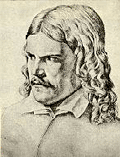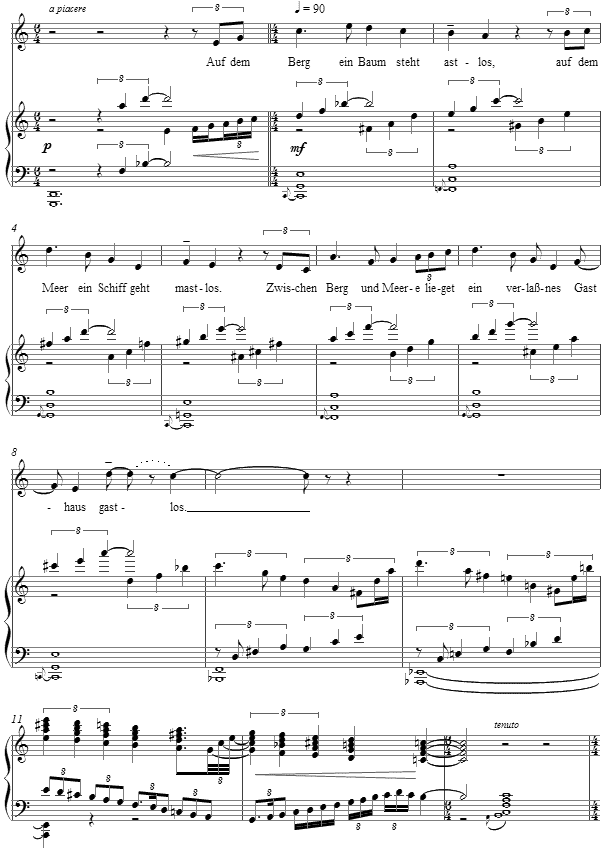Music and Texts of GARY BACHLUND Vocal Music | Piano | Organ | Chamber Music | Orchestral | Articles and Commentary | Poems and Stories | Miscellany | FAQs |
Aufgegeben Endreime - (2004)
Friedrich Rückert
for medium voice and piano
Auf dem Berg ein Baum steht astlos,
Auf dem Meer ein Schiff geht mastlos.
Zwischen Berg und Meere lieget
Ein verlaßnes Gasthaus gastlos.
Zwischen Gasthaus, Meer und Berge
Schweift ein irrer Wandrer rastlos.
Baum des Lebens, deine Krone
Welke! denn dein Stamm ist bastlos.
Ei, wenn du der Lust verlustig
Giengest, bist du auch der Last los.
[ 2 pages, 1' 15" ]
Friedrich Rückert
A Required End Rhyme
On the mountain stands a tree branch-less,
On the sea goes a ship mast-less.
Between mountain and sea lies
an empty guest house guest-less.
Between guest house, sea and mountain
a confused wanderer roams rest-less.
Tree of life, your crown withers
because your trunk is bark-less.
Ay, when you loose your joy,
then are you also burden-less.
Friedrich Rückert (1788-1866) was a German poet, translator, and professor of Oriental languages. It is reported that Rückert was "master of thirty languages," and made his reputation chiefly as a translator of Oriental poetry and as a writer of poems conceived in the spirit of Oriental masters. He was appointed a professor of Oriental languages at the university of Erlangen in 1826, and in 1841 he was called to a similar position in Berlin, where he was also made a privy councilor. In 1849 he resigned his professorship at Berlin, and went to live on his estate Neuses near Coburg until his death.
Rückert was born in Schweinfurt, the eldest son of a lawyer, and educated there and at the universities of
Würzburg and Heidelberg. During the period from 1816-1817, he worked on the editorial staff of the Morgenblatt at Stuttgart. Nearly the whole of the year 1818 he spent in Rome, and afterwards he lived for several years at Coburg (1820-1826).
When Rückert began his literary career, Germany was at war with Napoleon. In his first volume, Deutsche Gedichte, published in 1814 under the nom de plume of Freimund Raimar, he wrote, particularly in his powerful "Geharnischte Sonette," of the prevailing sentiments of his countrymen. In 1815-1818 appeared Napoleon, eine politische Komödie in drei Stücken (only two parts were published), and in 1817 Der Kranz der Zeit. A collection of poems, Östliche Rosen, was published in 1822, and from 1834-1838 his Gesammelte Gedichte were published in six volumes, since appearing in many varying editions.
Rückert had colorful imagination which made him sympathetic to Oriental poetry, and it is said "he has seldom been surpassed in rhythmic skill and metrical ingenuity" having written in various poetic forms "with equal ease and grace."
This setting encourages an over-pronunciation of the "end rhyme," as the text pokes fun at forced rhyming, so often a feature in the work of lesser poets. This is reflected in the "wrong note" accompaniment, making its own kind of internal nonsense.
The score is available as a free PDF download, though any major commercial performance or recording of the work is prohibited without prior arrangement with the composer. Click on the graphic below for this piano-vocal score.

